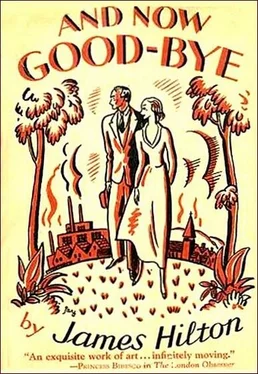“I go back to-morrow. Just a business visit. I’m afraid I must have kept you waiting a long time—the traffic delayed me. What a crowd there is here!”
“Yes,” she agreed. They were still standing exactly where they had met, on the edge of the pavement, surrounded by eddies of omnibuses, cabs, and pedestrians. “Have you had tea?” she continued. “Because if not we might find it quieter inside a caf�.”
“Ah, a good idea.” He had forgotten all about tea himself and was relieved by the suggestion. It would be easier, no doubt, than talking in the streets. There was a Lyons tea-shop within a few yards of them, and they made their way to it, finding a couple of scats at a small table in a corner of a first-floor room. In the sudden brilliance of electric lights his eyes were dazzled at first, but as soon as he could see her clearly again he felt indignation and determination rising in him to fever-point—she must not, must not, do a thing like that—it was monstrous, a sin more certainly a sin than anything he could ever have imagined. He wondered how he should broach the matter, whether directly or by oblique remarks; or whether, during tea, he had better let the talk remain just casual. But it was she who left him no choice, for she said, almost straightway: “Did you give my message at home, Mr. Freemantle?”
He shook his head. “I’m afraid I didn’t.” Then he went on, slowly and with not half the fluency he had hoped for: “The fact is, you don’t seem to realise what—what a commotion you have caused by—by leaving home like this.”
“Has there been such a terrible fuss?”
“Well, naturally. What else could you have expected? Your parents are both extremely upset, and I would gladly have conveyed your message if I had thought it would relieve their minds at all. Unfortunately it seemed to me quite likely to make matters worse, which was why—or one of the reasons why, at any rate—I didn’t do as you suggested.”
“You mean that they wouldn’t have been relieved to learn that I’m all right and quite happy?”
“Well, that’s not quite the way to put it. You must remember how deeply you have hurt their pride as well as their affections. I saw your father the other day, and I found him in a very angry mood about you. After all, you can understand that, I’m sure. He feels you have disgraced him. But I still think it possible—even probable—that if you were to go back now, immediately, giving up all—all that you have in mind—they would be reasonable with you. At least I can promise that I would do my best to smooth matters over.”
“That’s very kind indeed of you, Mr. Freemantle, but really, you know, I haven’t the slightest intention of going back. You mustn’t think I’m repentant or anything like that. I’d like to be on good terms with them if it’s possible—that’s why I wrote to you—but I can’t alter my plans.”
He faced her solemnly for a long moment and then said: “I hope you realise that unless you do go back, your parents arc quite determined to have nothing more to do with you—ever.”
“Well, I suppose if they take up that rather silly attitude, I’ll have to make the best of it, that’s all.”
“Make the best of it and go back?”
“No. Make the best of it and stay away.”
She spoke so calmly that he just stared at her in amazement and then replied: “You really mean that—quite finally?”
“Why, of course. I do Hope you haven’t made a special journey here just to try to argue me round.”
“Oh, no, no—not at all.” He seemed tremendously eager to convince her of that. “Oh no, you see, I had to come to London to make arrangements for a new heating apparatus we are having installed in the chapel—it was just an idea of mine that, since you were in London also, we might meet and talk things over. I’m sorry you’re so determined—I had hoped, you see—” And all the time he was stammering these and similar things, he felt: You’ve failed, You’ve bungled it all, You can do nothing with her! Where’s that marvellous eloquence you were going to employ? You’re no use, and why, in Heaven’s name, should you ever have imagined you could be? Does anybody decide on a course of action as important as hers is and then give it up because a parson comes along with a few tea-table platitudes? And suddenly, with a new note in his voice, he leaned towards her across the table and began to speak, not with his usual easy flow of words, but in sharp, broken sentences and in a voice husky with disappointment: “My dear girl, I’m not preaching at you—don’t think that—I don’t want you to think I’m talking to you as a parson just, shall we say, as a friend—a friend rather older than you—though even that I won’t plead too strongly, because in some ways I’m nearly as much a stranger to life as you are. Perhaps you don’t know what I mean by that—well, never mind, it doesn’t matter—it’s a side issue. What I feel is that I want to talk to you—perhaps impertinently, in a way—I want to tell you how this course that you’re taking strikes me, as a complete outsider. It’s difficult, really, for me to express what I mean; I don’t want to bring in the question of morals; I’d rather put it to you as a matter of wisdom—after all, you probably believe in wisdom—you don’t look at all the sort of person to act recklessly, without thinking things out beforehand—”
“I’ve thought out everything beforehand, I assure you.”
“I know, I expected you to say that. All the same, there are times when one’s thoughts aren’t very reliable, when imagination loses its proper perspective, runs riot, as it were—do you know what I mean? It’s like all this new mathematics—I’ve been reading a book about it lately. Normally we live in a Euclidian sort of world—straight lines, everything very logical, just the ordinary life that we all grow accustomed to—then, suddenly, without any warning, something gets hold of us and we go switching over into an Einstein world full of curved space and parallel lines that do meet in the end—all very marvellous and perhaps truer, in a way, than the other sort of world, but we can’t afford to think so, because it wouldn’t work. All I want is for you to ask yourself whether what you are going to do will work—will it be a practical success—will it—will it—do you—are you going to—” He stopped abruptly and continued, after a pause and with a slight smile: “I wonder if you really understand what I’m talking about?”
“I think I probably do,” she answered cautiously, “though I’m puzzled to know why you’re talking about it.”
“Because I must , whether I offend you or not. To be quite frank, this man whom you know, whom you’re proposing to go to Paris with—is he—”
Her eyes widened incredulously. “A man? ” she interrupted. “What man? And you say I’m going to Paris with him? Really—”
“Please don’t be offended. As I told you at the beginning, I don’t intend to preach—”
She suddenly laughed. “But, Mr. Freemantle, it’s all so utterly ridiculous! Oh, how absurd it is!” She laughed again, a little helplessly. “I can’t imagine how you got hold of such an idea. There’s no man at all. I’m not going with anybody.”
“You mean to say it’s all untrue? You’re not going to Paris with—with that man—”
“I am going abroad, certainly, but not with that man, or any man. And not, incidentally, to Paris, either. But I wish you’d tell me who that man is. I’m quite curious about him.”
His eyes, watching her and her amusement, half-filled with tears, he did not know why, and all the world around him seemed drowned in the most shattering and unspeakable loveliness. “I—I don’t know what to say,” he stammered. “Of course I’m only going by all the talk in Browdley; how people find everything out I can’t think. Someone, I believe, saw you getting into the train at Manchester with this man—a musician, I understood—”
Читать дальше











